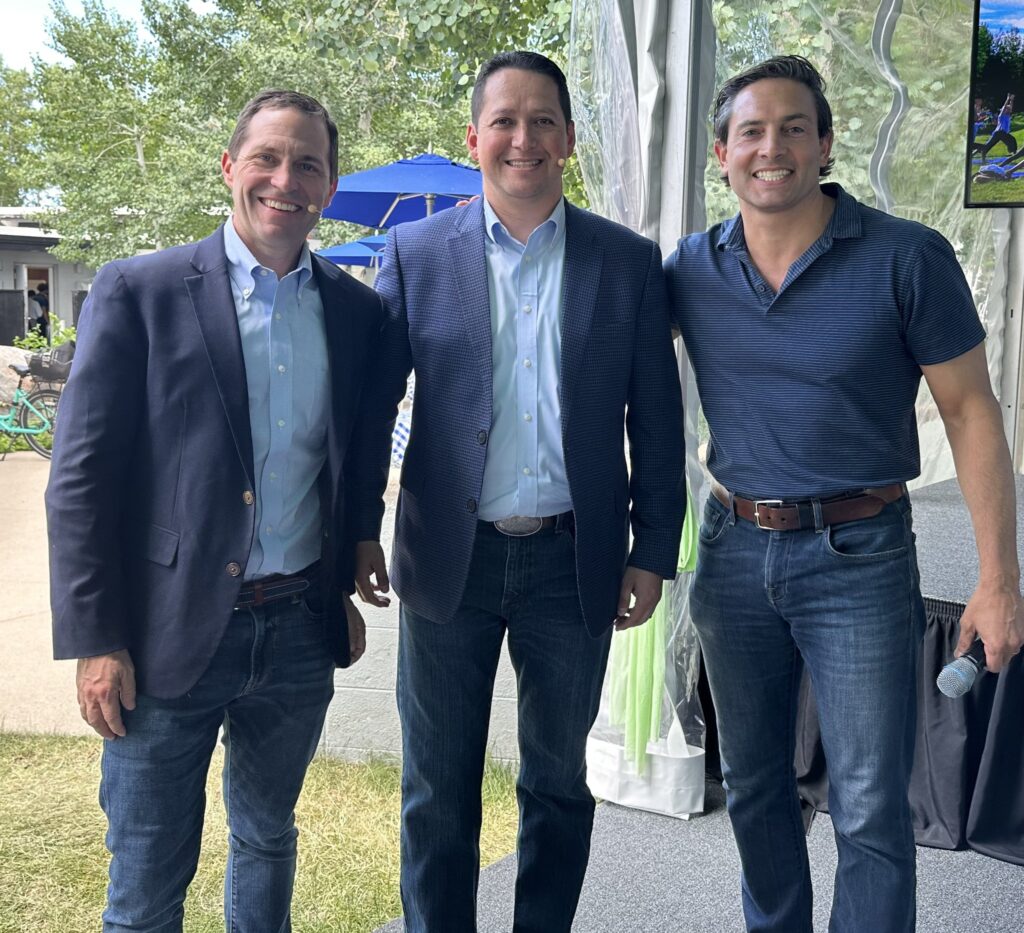In perhaps the most partisanly charged era of American politics, two U.S. House members are trying to showcase that reaching across the aisle is still feasible.
Rep. Jason Crow, a Democrat representing Colorado’s 6th District, and Tony Gonzales, a Republican from Texas’ 23rd District, are co-chairs of the For Country Caucus that focuses primarily on national security and veteran issues. The caucus has successfully collaborated on 79 pieces of legislation passed in the last four years, according to Rye Barcott, who introduced a panel consisting of the two congressmen and moderator-journalist Katie Couric at the Aspen Ideas Festival on Thursday.
Even in a time of intense polarization, Crow and Gonzales believe that bipartisan work is still getting done, even if it’s not in the focal point of the public.
“The reputation of Congress as an ineffective body is, in many ways, justified,” Crow said. “Major things are not being addressed and we have hit gridlock on some of the most formative challenges of our day. But there are also a lot of things that are getting done and there is a lot of collaboration.”
Couric, in her opening question, pondered whether the public’s lack of faith in Congress is warranted. She cited an NPR/ PBS NewsHour/Marist poll that showed 74% of respondents want Congress to compromise but 58% had “absolutely no confidence” in their ability to do so.
Still, a Pew Research Center release in January showed that right-leaning voters believe congressional leaders should “‘stand up’ to Biden on matters that are important to GOP voters, even if this makes it harder to address critical problems facing the country,” at a rate of 64%. The same study showed 58% of left-leaning voters believe Biden should work with the GOP to accomplish things, even if it “disappoints some of his voters.”
The For Country Caucus currently boasts 15 Republican members and 10 Democrats, not including co-chairs and vice chairs on each side of the aisle. It led initiatives to improve mental health services in the Department of Defense, military hunger prevention efforts and support for Special Operations Gold Star Families, according to its website. It’s also worked on cybersecurity and overall tech efforts.
Both Crow and Gonzales are veterans, the former of the Army and the latter of the Navy. In March, Gonzales was officially censured by the Republican Party of Texas, citing his support for gun reform after the mass shooting at Robb Elementary School in Uvalde, Texas, within his district and same-sex marriage, breaking party lines.
“The takeaway is we have a deep, serious issue in this country that we have to get ahead of and it’s going to take people that are bold and can navigate the process,” Gonzales said. “I’m of the mindset it doesn’t have to be either or. We can protect the Constitution and we can protect our children in school.”
Gonzales said one of the consequences of being censured was being cut off from financial support, which he joked he wasn’t receiving to begin with.
Couric also queried the pair on some of the major topics of the day, perhaps showing where the limits of bipartisan collaboration and cooperation may be. Gonzales equated the investigations of former President Donald Trump to current President Joe Biden pertaining to their handlings of classified documents, while Crow cited the violence incited by Trump on Jan. 6, 2021, to draw a delineation. Crow did not speak directly to the investigations.
When asked directly by Couric if Gonzales still supports Trump, he did not directly answer, and spoke of the perceived double standards of treatment between Trump and Biden, “instead of calling balls and strikes.”
Couric also asked about the U.S. Supreme Court’s decision to shoot down affirmative action in college admissions, reversing a national policy of long-standing benefits for enrollment of minority students, a reparative measure for those with less access to higher education. The SCOTUS justices did not deviate from their known political ideologies, according to The Washington Post. Six conservative members made up the majority while the three liberal members dissented.
Crow acknowledged that it was one of the areas where he and Gonzales are “going to respectfully disagree.” He called the decision “a move in the wrong direction,” and cited a footnote in the majority opinion that he said means the decision doesn’t apply to military academies.
“They’re saying here that diversity does matter if it comes to our national defense and that communities of color are good enough to fight and die for our country and that’s OK, but not necessarily in every other context,” Crow said. “What I hear a lot from (my constituents) is that things like that just reinforce this notion that there’s a dual standard.”
Gonzales said the “affirmative action position, I think it’s coming to an end,” and spoke of his time in the military when race, religion and sexual preference “didn’t matter … and I would love for this country to get back to us being Americans.”
Couric asked the congressmen to give a reason for hope to close the panel. Gonzales said he truly believed that the United States is the greatest country on the planet and “that we need to remember that we have more in common than we don’t.” Crow said he believed in the country’s ability to correct its mistakes and still be proud and move forward.
“We can do both and we must do both,” Crow said.
